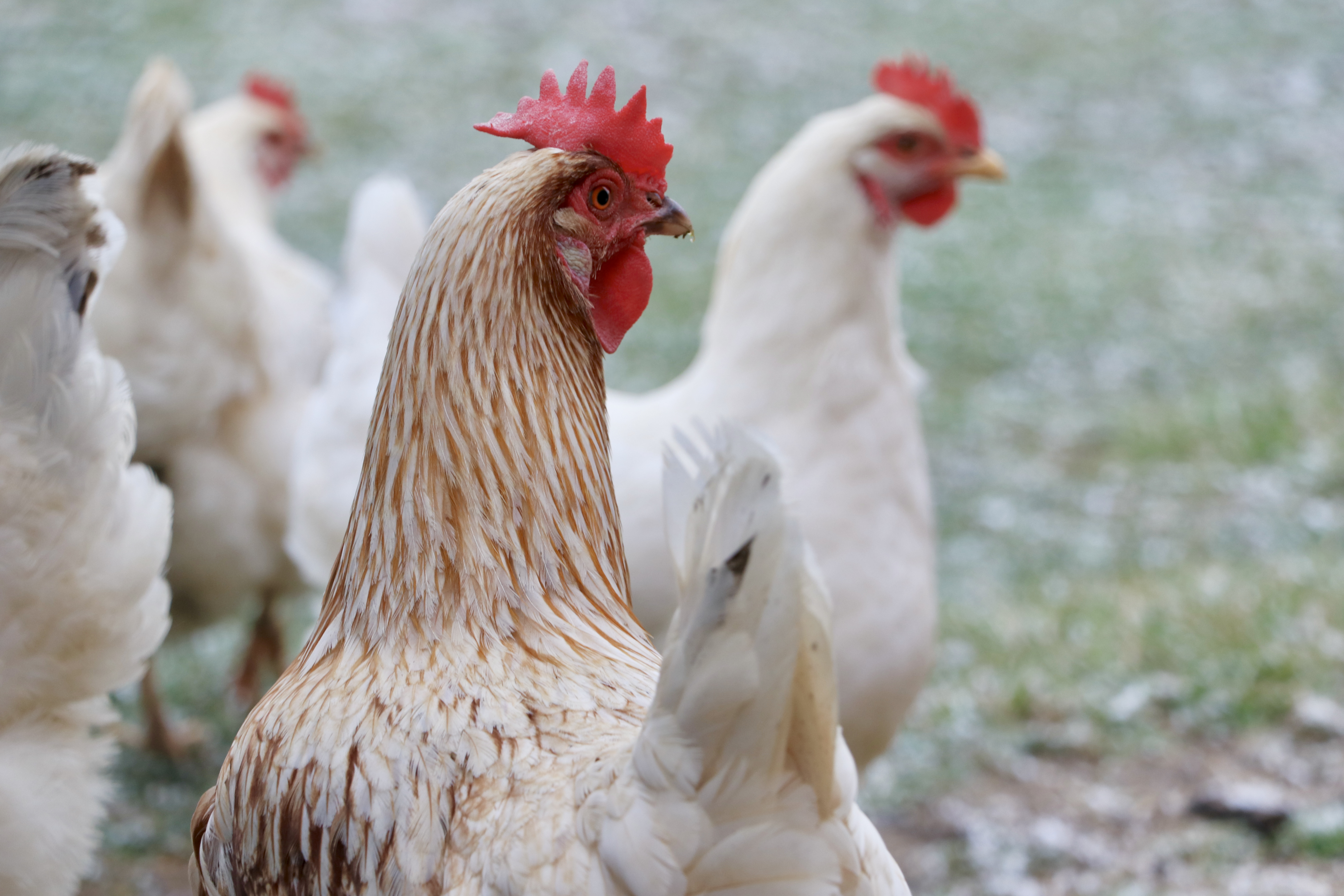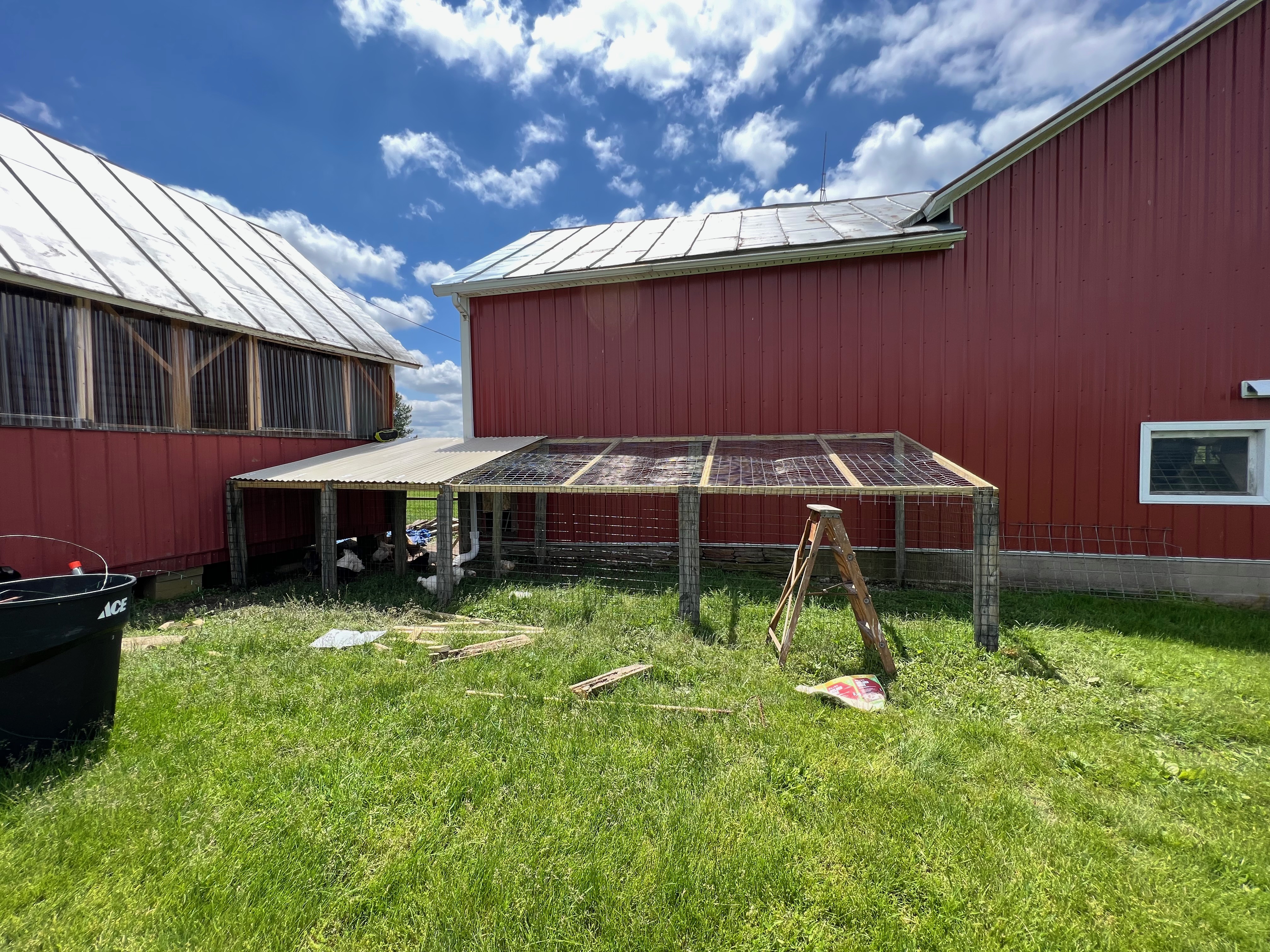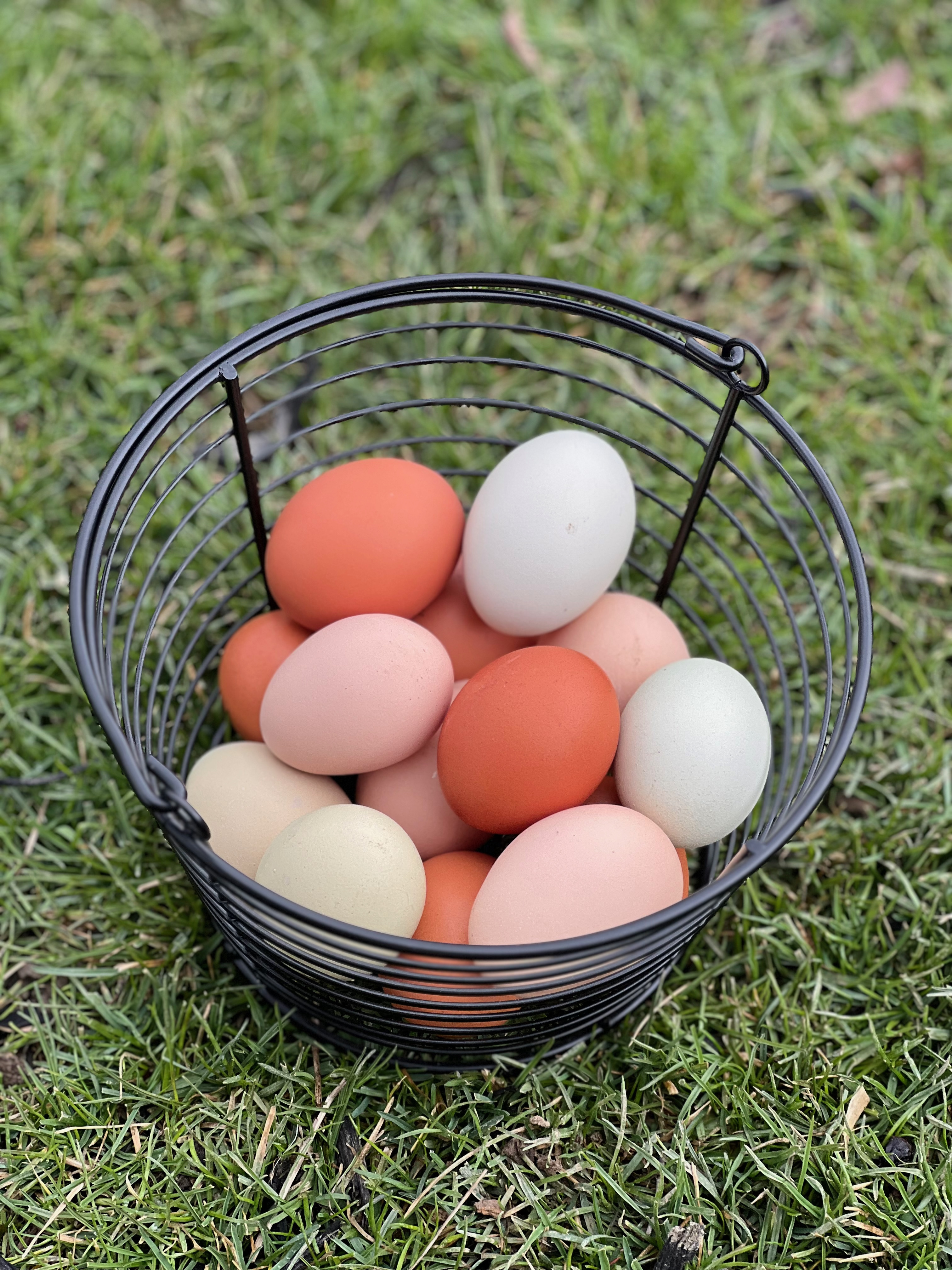How to feed, water, and protect your chickens. Do I need a rooster around to get eggs? Find out in this series Backyard Chickens 101!
The Dream of Owning Backyard Chickens
Owning chickens has been a dream of mine for a couple years. The house we lived in before moving out to the Metzger Acres property, was within city limits and chickens were not allowed. Word to the wise; always double check with what your city allows you to keep on your property to avoid fines or other repercussions. And definitely consider that before purchasing a property if you intend to raise any animals in the future.
Luckily, we lived on the very edge of the city limits and a few miles down the road, people were selling farm fresh eggs. I remember the first time I cracked into one. The deep orange yolk actually caught me off guard. After researching, I learned that the richness of the yolk color comes from the chicken eating a diverse, nutrient dense diet. These particular eggs came from free-range chickens that had the freedom to scratch around in the yard for bugs, grass, or anything else they could find. After that, I was sold. I no longer wanted to eat traditionally raised eggs from the grocery store with pale yolks, barely the color yellow. I wanted to raise my own chickens!

Whenever diving into something new, there is always a learning curve. My hope is that I can share info in this series that helps you avoid wasting time being unaware of certain aspects of chicken keeping (like I was), so you can make informed decisions and get started as soon as possible!
Basic Chicken Vocabulary
| Term | Definition |
| Hen | full grown female chicken (older than 1 year) |
| Rooster | full grown male chicken (older than 1 year) |
| Pullet | young female chicken that is not egg-laying age yet |
| Cockerol | young male chicken that is not fully matured |
| Layer (Laying Hen) | Female chicken (hen) of a breed that has been identified as having good egg laying capabilities |
| Broiler (Meat Bird) | Chickens for meat consumption (also called Roasters, Fryers) |
| Dual Purpose Breed | Breed of chicken that has good egg laying capabilities but also works well as a bird for meat consumption |
Chickens are pretty low maintenance and have a few basic needs: Food, water, and shelter/protection. For simplicity’s sake, I will only be talking about chickens kept for egg production, or a laying flock, in this article. Meat birds have entirely different needs when it comes to food and shelter.
Feeding your Backyard Chickens
When it comes to feeding your laying flock, just about any generic Layer Feed will suffice. These feeds are loaded up with the nutrients, minerals, and protein that your hens will need to produce eggs. Protein is extremely important for egg production, which is why chickens can’t just live on traditional kitchen scraps or veggies alone if you want to get eggs consistently. You can, however, make your own chicken feed if that is something you are interested in. Here is a great recipe! Otherwise, your local feed store (Tractor Supply, Rural King, etc.) will carry several brands to choose from.
The only other consideration when feeding your laying flock is their age. Birds under 18 weeks old should be fed a “grower” feed. This is because they are still developing and growing. Most laying hens will begin laying eggs around 18-22 weeks. Obviously every hen is different and every breed is different. My very first egg came from a chicken about 17 weeks old. But I also had birds from that same flock wait until 22 weeks to start laying. Different breeds lay different color eggs. The eggs taste the same regardless of shell color.

After the first 18 weeks of their life, the birds can be switched to a Layer feed designed for birds of laying age. When purchasing feed at the store, most store associates will be able to help you with any questions. Our local Tractor Supply and Rural King employees are a WEALTH of knowledge when it comes to several different kinds of animals. When in doubt, follow the instructions on the back of the feed bags.
Watering your Backyard Chickens
Watering your chickens is pretty much like any other animal. They should have free access to water 24/7. Keeping their water fresh and clean will help your chickens maintain their health. Many people suggest adding a splash of apple cider vinegar to your chicken’s water to aid in digestion and add probiotics. Some say it helps reduce the odor in their fecal matter. I have never found this to be necessary and did not notice any difference when I used ACV versus not using it.

Shelter & Protection for Backyard Chickens
Shelter and protection are vital to keeping your chickens alive and well. Chickens are extremely vulnerable to predators. A well designed and reinforced chicken coop is essential. Our coop was built inside our barn where predators cannot get inside. It is also important for your coop to have air flow. Chickens poop a lot and their manure contains ammonia. Maintaining good airflow is essential, not only to keeping smells at bay, but also for the health of your chickens and reducing the amount of ammonia they breathe. Not to mention, when the weather gets hot, your chickens will die if they do not have airflow inside of a hot coop.
What is a Chicken Run?
If you choose, you can create a run outside of your chicken coop. A run is an enclosed outdoor area that is fenced off so your chickens can’t get out and predators cannot get in. We use our run on the days we are not home. The chickens can move freely between the coop and the run. They are protected from predators but still have access to the outdoors where they can forage for bugs and scratch in the dirt.

When we are home, the chickens have access to free-range around our entire property. Free-ranging your chickens sounds idyllic, and some days it is. But there are also some circumstances that would not be safe or ideal for chickens to free-range, i.e. proximity to busy roads, neighbors close by (especially ones not fond of chickens), dense woods or tall grass/crops near your property where predators could easily hide, or not being okay with chicken poop on your driveway, sidewalk, patio, etc. Look out for future posts where I will go more in depth on the different ways to keep chickens.
Coop Size Recommendation
When building or buying your chicken coop, it is important to consider how many birds you plan to keep. The standard recommendation is about 4 square feet per bird. For example, if you plan to keep 10 birds, you would need about 40 square feet for your coop. That recommendation doubles to about 8 square feet per bird for their outdoor run.
Egg Production & Roosters in the Backyard Chicken Flock
One question I had for a long time before owning chickens was whether or not you needed a rooster present to get your chickens to lay eggs. The answer is no. Hens will lay eggs regardless of a rooster being present. However, the rooster must fertilize the egg before it is laid in order for it to have the possibility of becoming a chick. That is obviously not important if you are only keeping chickens to consume their eggs.

Keeping Roosters in your Backyard Flock
In my experience, the benefits to owning a rooster are having the capability to hatch my own chicks, as well as the protection the rooster offers the hens. I must give warning that I have heard several negative stories of people owning roosters. Roosters tend to get protective, and sometimes territorial, over their hens. If this happens, there is a possibility of the rooster becoming aggressive toward the hens, other roosters, or people. I have also heard stories of roosters giving their life to protect their hens. A family member witnessed her rooster saving his hens from a hawk while sacrificing himself and allowing the hens to get back in their coop.
Another point of consideration with roosters is their crowing. Around 6-10 weeks old, roosters may begin crowing. Movies and TV made me believe roosters only crow first thing in the morning. I can’t speak for every rooster but our roosters crow all day long. They crow as a warning to their hens if air predators are near, to call them back if they have strayed too far, or just for fun 🙂 This can be a drawback if you are in close proximity to neighbors.

Follow for more on Backyard Chickens!

My goal is to simplify all the noise around keeping backyard chickens. They truly are very low maintenance and such a fun part of my day. Plus, you really just can’t beat the feeling of gathering up that beautiful basket of eggs everyday! Additionally, I have several other posts about backyard chickens including how to set up the chicken coop, how to raise baby chicks at home, and the pros and cons of keeping a backyard flock! Check them out to learn more and determine if keeping backyard chickens is for you. Spoiler alert, they probably are for you! 🙂
I hope you enjoyed this peek into Life at Metzger Acres.


Great
Great article on the basics of raising chickens! It’s important to do research and consider the necessary factors before getting chickens, and this article provides helpful tips and information for beginners. Looking forward to reading more in the series.
Eamon O’Keeffe
https://livefreeoffgrid.com
Thanks for the kind words, Eamon! Check back in next week for the next article in the series!
Some truly quality blog posts on this web site , saved to my bookmarks .
Excellent post. I was checking continuously this blog and I am impressed.
As I site possessor I believe the content material here is rattling fantastic , appreciate it for your hard work. You should keep it up forever! Good Luck.